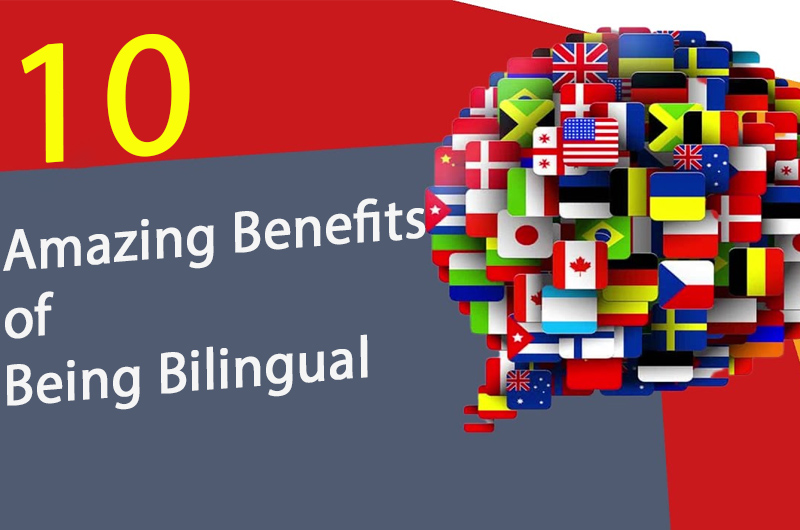Bilingualism has been an interesting research study for many years. The benefits of being bilingual or multilingual have been identified in many studies. Both adults and children alike can benefit greatly from bilingualism.
Here are the points for this post in explaining the benefit of being bilingual.
- Bilingualism positively impacts our brains.
- Bilingual children perform well in education.
- A popular demand at the workplace when you are bilingual.
- Health benefits of being bilingual.
- Bilingualism opens your mind.
- Being bilingual helps your travel.
- Bilingualism opens up more social opportunities.
- Bilingual to multilingual.
- Your bilingual children.
- Bilingualism is no longer considered a minority.
1. Bilingualism positively impacts our brain
According to The Cognitive Benefits of Being Bilingual, people who speak a second language have a better attention span and can master multi-tasks much better than monolinguals because you constantly switch from one language to another. There is also an indication that bilingualism reduces the chance of people getting a stroke.
Both adults and children show cognitive benefits. Babies who are 7 months old and are in a bilingual environment tend to respond better to changes. Bilingual adults also show less cognitive decline compared with monolingual.
2. Bilingual children perform well in education
Studies show that children who speak a second language can focus more on tasks than those who are not bilingual (cognitive benefits studies). This is because children who are educated in their second language tend to catch up with others to prove them to be equal; hence they are more likely to outperform monolingual students the same age.
According to Millennium Cohort, the educational benefits of bilingual children are significant. Bilingual kids who are taught in their second language usually lag behind others when they are around 3-5 years old, but they soon become equal to their classmates by the time they reach the age of seven.
3. A popular demand at the workplace when you are bilingual
Being bilingual opens more job opportunities to you due to the mass scale of industry globalization nowadays. Every workplace relies on communication, and a second language will greatly benefit employers.
Industries such as tourism, journalism, and translation seek great value in bilingual employees. You will be spotted immediately and moved up to the top of the list in a job application process if you have highlighted your bilingual skills in your resume. This gives you a better chance for a job offer than applicants who speak only one language.
4. Health benefits of being bilingual
According to a study, An active and socially integrated lifestyle in late life might protect against dementia Swedish researchers Fratiglioni L1, Paillard-Borg S, and Winblad B bilingualism provide health benefits such as delaying Dementia and Alzheimer’s diseases.
There are also other indications, such as faster stroke recovery and the low presence of stress levels.
5. Bilingualism opens your mind
People who speak two different languages may seem like having two different characters in one. That’s why Charlemagne said, ‘To have another language is to possess a second soul.’
It gives you an open mind to see the world from different cultures and understand its different ways.
Bilinguals are used to change as a phenomenon; it makes them easily adapt to new environments and accept new technologies. They can be open-minded to new experiences because they already see the world from multiple views.
6. Being bilingual helps your travel
This is definitely an advantage when you are traveling with your working colleagues. Imagine they rely on you to guide them from place to place! Not speaking the local language means you have your pocketbook and translation app on your hand wherever you go; if you get lost in big trouble, you can’t even phone the police or tell the taxi driver where you’d like to go!
The travel experience will be much more different if you also speak the language with local people. There’s no ‘Lost in Translation’ for you! You will enjoy the culture much more while speaking their local language where everyone can understand you.
7. Bilingualism opens up more social opportunities
Bilinguals will always have friends from 2 different languages, which means more opportunities to meet new people and business associates in the workplace.
Cultural understanding is also better in bilinguals, which means they blend well in a different cultural environment. This gives them a huge social advantage and leads to bigger opportunities in life.
8. Bilingual to multilingual
Studies show it is easier for bilinguals to learn an additional language or languages. As they have already developed skills in language learning, it comes naturally for bilinguals to pick up another language by using their existing language skills.
The better they learn, the better their confidence grow, which will lead to better language learning result.
9. Your bilingual children
Parents with bilingual language skills have a better chance to pass on their children their language skills. Imagine the benefit they pass on to their children. Many children speak two different languages from birth; they grasp the language in a natural way from adult language learning.
Not all parents can teach their children both languages, but those who do, provide greater opportunities for their kids’ future. For more about ‘raising kids bilingual, please click here to read more.
10. Bilingualism is no longer considered a minority
Following globalization in the world, bilingualism is no longer a rare phenomenon like it used to be in a community. Nowadays, people accept bilingual people as a norm and part of society, bringing harmony to the world.
In the past, people used to stare at people who spoke a second language; it is very much considered a norm and not a minority, as bilingualism is valued as a great skill. This leads to more equal opportunities in society. It also encourages the world to catch up on their language skills so that more cultures and values can be understood worldwide.









